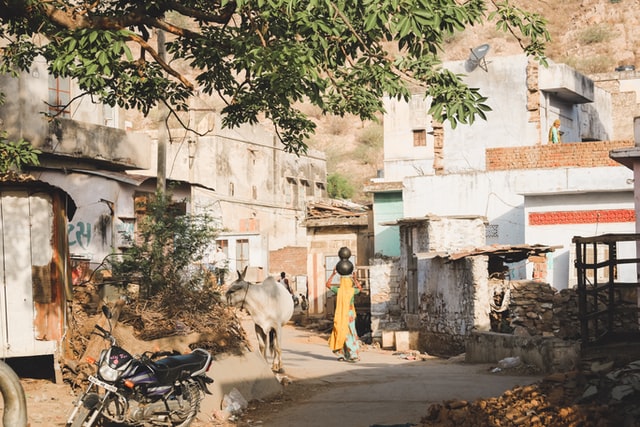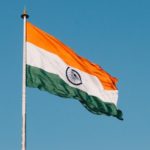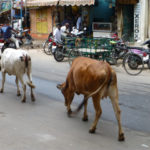Women in India: The Truth about Honor Killings and Arranged Marriages

I read India Dishonoured: Behind a Nation’s War on Women by Sunny Hundal some months back but it sticks with me everyday, perhaps giving me the greatest understanding of the complexities for Indian women to exercise ‘freedom and choice.’
Here are some basic facts about women in India:
- In every state in India, women’s literacy rates are lower then men’s.
- Girls have fewer opportunities to continue their education after 15 years of age.
- The majority of women work in agriculture – largely determined because of who they have married.
- There has been no significant increase in the number of female MPs since India’s independence in 1947.
These statistics aren’t unique to India; they bear similarity to other Asian and African countries, but in 2012 India was rated the worst G20 country for women. Worse than countries like Afghanistan and Saudi Arabia! ?The study undertaken by Reuters concluded that Indian women were particularly vulnerable because of high instances of child marriage, dowry related deaths, trafficking and slavery.
But why? Modernisation?
Over the last two decades India has witnessed one of the biggest economic booms in its history. Cities are thriving, the use of technology becoming increasingly widespread, more young people completing basic education and unemployment rates low.
At the same time, India is witnessing a change in social attitude, with women no longer confined to the home, greater visibility in cities and many actively pursuing and succeeding in careers of their choice. This is particularly evident in the big metro cities.
However, instead of allowing women greater choice, this liberalisation is putting them in greater danger and stifling their freedom.
Mix into this a complicated caste system and an aspiring new middle class, and it makes for a complex set of rules and beliefs that are full of contradictions, making it almost impossible for women to make any of their own choices.
“The modern woman is seen to be on a collision course with our age old traditions, part sex goddess, part super achiever, loathed and desired in equal measures. A profound fear and deep, almost pathological, hatred of the woman who aspires to be anything more than a mother and wife is justified on the grounds of tradition. The battle is fiercer than ever before and it can no longer be fought in seminar rooms and government meetings. [For feminists] the battle will have to be fought on every issue from dress code to mobile phones to love marriage to divorce to the right to education.” – ?Sagarika Ghose, Deputy Editor CNN-IBN quoted in Hindustan Times
Shockingly, in Punjab one of the most common ways to dispose of an unwanted baby girl is to place her in a pot, dig a hole and bury her.
The Delhi gang rape made headline news across the world and continues to be widely talked about. But for me, the newspapers are no better, used as a way to quote politicians’ ridiculous views on the situation and scaremonger rather than provide a platform for real discussion and change.
I question whether it was the media that forced the government to tighten up its laws and implement fast track systems. More likely it was the hundreds of thousands of people that took to the streets in protest.
This was without doubt one of the most horrific attacks in modern history but a few months later, the media moved onto other stories, the issue forgotten, not discussed in a public arena and ignored.
Akshar a young Indian man living in Rajasthan wrote from his heart when he published this blog, which received 500 views in 5 days of being posted!
“I have tears in my eyes writing this article. I haven’t slept last night thinking about her. I don’t know why but I am attached to her emotionally as if she was my family member. Damini is no more! May her soul rest in peace.”? She may have slept but she has awakened the whole country.” – Akshar Goswami, Jaipur, Rajasthan
Women in India: The Truth about Honor Killings and Arranged Marriages.
In 1991, the census indicated that the gender balance in India was 927 women to 1000 men, a notable drop from 1947 where the balance was 946/1000. States such as Bihar and Rajasthan have a sex ratio, which is amongst the lowest in the world 600:1000. ?But why is this such an issue?
This isn’t a blip in statistics or some strange phenomenon — it’s a result of gender selection.
The government banned sex-selection in public hospital in 1978 but this just led to the set up of private clinics.?? Slogans such as “pay 5000 rupee today and save 50,000 rupee (dowry) tomorrow” are openly displayed.
In rural parts of the country, the practice of ‘Kuri Mar’ is still prevalent. ‘Kuri Mar’ literally translates as girl killers. Shockingly, in Punjab one of the most common ways to dispose of an unwanted baby girl is to place her in a pot, dig a hole and bury her.
The government now has schemes in place to encourage parents to have baby girls but the fact still remains that to have a girl in India is expensive and does not offer the same security to parents as having a son. ?Perhaps the biggest culprit is the expectation that comes with marriage and dowry.
The amount of dowry varies greatly from family to family, from multiple times the family’s annual income to a substantial amount of the overall family’s wealth. ?Once agreed, the marriage takes place but the threat to the girl/wife does not end there.
“Some estimate that as many as 100,000 women are burned to death each year in dowry-related disputes and another 125,000 die from violent injuries that are rarely reported as killings. Victims frequently face ‘stove burnings,’ where in-laws pour cooking fuel over women and set them alight, so it appears as an accident.” – ?India Dishonoured: Behind a Nation’s War on Women by Sunny Hundal
To have any sort of relationship with someone outside of marriage is a complete no go.
In India, it is not okay to have relations with someone you love but it’s okay to get married to a complete stranger?
I still don’t understand the benefits of arranged marriages, but surely it’s better for people to be together because of love and not convenience? ?For people to have a choice about who they are with?? In India this is not even a consideration as marriage is one of the many ways that Indian society can control its women under the guise of protection. It is estimated that over 1000 women are murdered every year in honour killings.
“In December 2012, a young man by the name of Methab Alam calmly walked into a police station in the city of Kolkata, in east India, with the severed head of his sister in his left hand and a sword in his right, dripping with blood. He told a shocked policeman that he was ready to be arrested for the murder of his 22-year-old sister, who had been married off at the age of 14 ‘for running off with a lover and disrespecting the family'” – India Dishonoured: Behind a Nation’s War on Women by Sunny Hundal
In India, it is not okay to have relations with someone you love but it’s okay to get married to a complete stranger?
Honour killings are not unique to India. Such incidents are regularly reported in the UK.? In 2010 nearly 3000 honour attacks were reported to the police, as were 10,000 incidents of forced marriage.
So what will it take to change all of this?
“India currently has 37 million more males than females and it is estimated that the total ‘missing’ is around 50 million over the last three generations, thanks to abortions, infanticide, dowry deaths and other murders. By 2020, India will have an extra 28 million males of marriageable age. For context that is more than the entire male population of England. Given that India and China together represent approximately 36% of the entire world population, the sex ratio imbalance is unprecedented in human history and likely to have global implications.
“The problem isn’t just the police, politicians, justice systems, corruption or economic de-regulations: it is India’s unique brand of religiosity and ingrained ideas about the ‘honour’ of women that makes it so hard to change attitudes.” – India Dishonoured: Behind a Nation’s War on Women by Sunny Hundal
Women here don’t have that choice. Women here aren’t protected and honoured.
They’re told what to wear, what to do, where they can go, what time to be home, who to talk to, who to marry–every inch of their lives is dictated by a set of complex cultural, religious and societal rules that stifle their freedom.
India now needs to be brave enough to support more women to exercise their freedom and choice,? to live their own lives, in a society that truly protects and honours them.
Photo for Women in India: The Truth about Honor Killings and Arranged Marriages by Unsplash.








